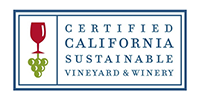Certified Sustainable: The South Coast Collection
High quality wines produced for YOU
What does that mean?
Implementing the best industry viticultural practices in the vineyards to ensure vine, soil and ecosystem/environmental health
Winemaking processes that protect the environment and conserve natural resources
Economic viability through shared knowledge of costing, integrated business strategies and long range goals for future advancement.
Our wines from our South Coast Collection are proudly designated as a Certified Sustainable winery/vineyard!
Sustainability at the winery
Our collections from our South Coast region winery has been certified sustainable through the California Sustainable Winegrowing Alliance since as early as 2013. All vineyards as well as both our still and sparkling winery operations are certified sustainable. Winemaking operations are held to the same standard as the vineyards. We monitor and measure resources as we work working towards limiting our impact in all aspects of wine making.
Why are we sustainable?
We face many environmental challenges as the planet’s climate shifts. In Southern California, we experience extreme heat events in the summer and unpredictable drought and the threat of wildfires throughout the year. Because of these weather events we know firsthand how important protecting our environment can be.
In our South Coast collection you’ll find wines from four different vineyard locations. Our “Darkest Hour” Syrah is grown on Wild Horse Peak which is located on the Palomar mountain range bordering the Cleveland National Forest. This rural vineyard relies on the rainfall we get throughout the year and farming practices that incorporate the surrounding natural ecosystem. The other three vineyard locations located on the valley floor are grown with consideration of our neighboring farms and shared resources.
Three major focuses for vineyard practices within the vineyards are the management of our soil, water, pest and disease threats.
Soil Management – We work with our soil and keep it healthy by monitoring and adjusting our organic matter and nutrients.
Water Management - We practice water conservation in all of our vineyards, measuring the water used and implementing drip irrigation techniques. Our mountain vineyards rely on rain collected and stored in our aquafer.
Pest Management – We work to minimize the use of unnatural products in our vineyards and are proactive in our monitoring and treating of pests and diseases.
A very important factor for the health of our vineyards is the ecosystem that surrounds it.
By monitoring the surrounding animal activity we can gauge how the health of our vineyards are doing. When the surrounding environment is thriving with animal and plant life we know that our vineyards are healthy. Animals frequently seen are owls and birds of prey. We provide habitat enhancement to encourage them to nest and feed in the area as a way of pest management. Other animal species commonly seen are coyote, California toad, American Bullfrog, Gopher snake, California King Snake, Garter Snake, Western Rattlesnake, Roadrunners, Horned lizards, and multiple varieties of birds and reptiles.
Who is the CSWA?
The California Sustainable Winegrowing Alliance (CSWA) is a non-profit organization that was created by the Wine Institute and the California Association of Winegrape Growers. This organization supports and promotes sustainable winegrowing practices throughout the state of California.
How it Works
The CSWA performs a yearly audit to inspect the ongoing compliance of our operations. We must comply with all requirements set by the organization as well as show improvements from the previous year and new plans for the upcoming year to continue to be sustainable.
The goal at our South Coast location is to continue to develop a sustainability program in order to lessen the impact on the environment while continuing to make exceptional wine.


